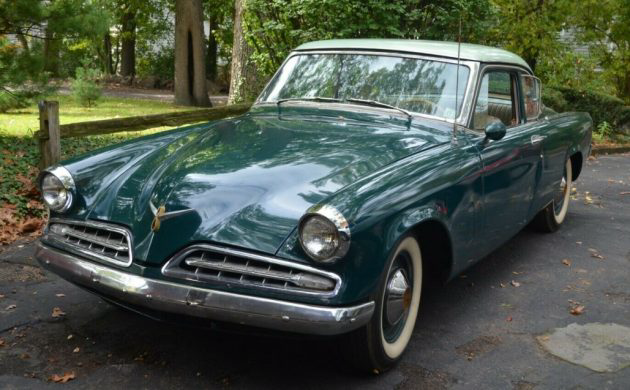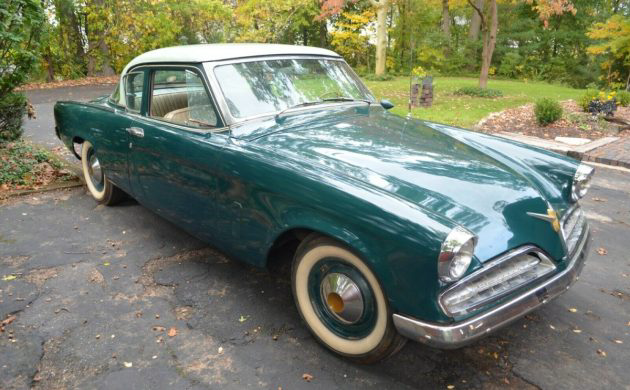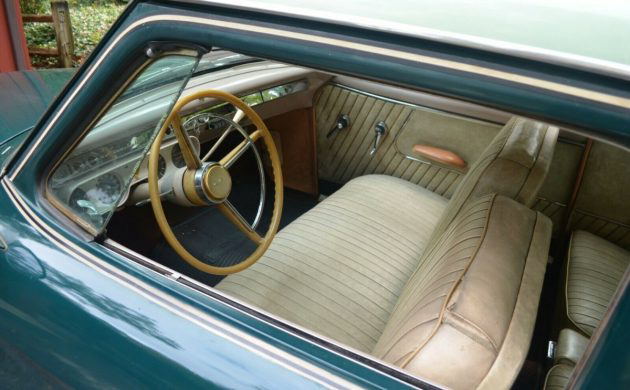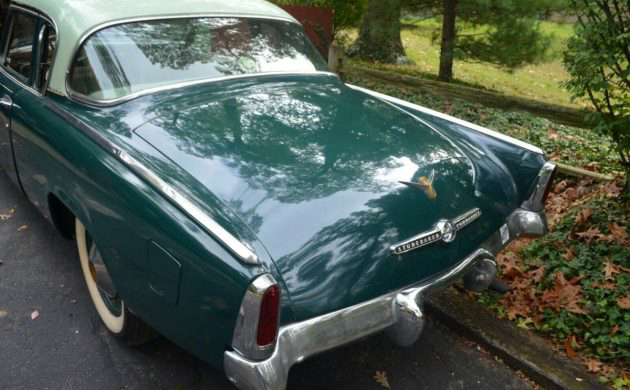By 1954, Studebaker was looking financially embarrassed. That’s a polite way of saying that it was losing money at an alarming rate. Management faced the choice of merging with another manufacturer or collapsing into bankruptcy. Eventually, a merger with Packard occurred, but this strategy merely served to delay the inevitable. In the meantime, Studebaker produced cars like the 1954 Commander. While not the most powerful car on the planet, it featured a V8 of legendary toughness. Our feature car still houses a V8 from that family, but it is a later version offering more power and performance. The car runs and drives but needs a little TLC to return to its rightful place on our roads. Located in South Bend, Indiana, you will find the Commander listed for sale here on eBay. Subdued bidding has pushed the price to $8,600, but this remains short of the reserve.
The seller located the Commander hidden in a garage, a spot it seems to have occupied for a while. At first glance, it presents pretty nicely in its combination of Lance Green and Azore Green. The paint holds a respectable shine, with no signs of patchiness or crazing. However, a closer inspection reveals a few dings and marks, and rust appearing in one rocker. It is unclear how extensive its problems are, with the seller revealing a previous owner has already patched the floors. Before we write the car off, it is worth noting that it underwent a Ziebart treatment at some point, which could be good news worth remembering. Still, an in-person is always a wise strategy with any potential classic car purchase, and this Studebaker should be no exception. The chrome looks acceptable for a survivor-grade car, as does the glass. The seller includes replacement front and rear glass that the buyer could squirrel away in case of a later breakage.
While Studebaker has long been considered a relatively conservative manufacturer, one area where it proved a groundbreaker was in engine technology. When the company released its new OHV V8 motor for the 1951 model year, only Cadillac and Oldsmobile offered anything but a flathead V8. With a forged crank and conrods, these engines were gems that proved extraordinarily tough. Unfortunately, they were also heavy, negatively impacting their power-to-weight ratio. Our feature car rolled off the line with the 232ci version that produced 120hp. However, a previous owner ditched that V8 in favor of a later 259ci unit. Its specifications are unclear, but it would be fair to expect that it should produce at least 162hp. Bolted to the engine is a three-speed manual transmission with optional overdrive, and this combination should make the Commander a lively and accomplished open road tourer. The seller revived the Studebaker after years of hibernation. They cleaned and relined the fuel tank and rebuilt the fuel pump and carburetor. New plug wires and a new master cylinder found their way under the hood while the front brakes are rebuilt. The vehicle runs and drives but shouldn’t be considered roadworthy. The rear brakes aren’t connected, the tires are old, and some of the lights don’t work. The list of tasks may seem long, but they are the type that the buyer could undertake themself with a sense of satisfaction.
If considered a survivor-grade car, the Commander’s interior presents acceptably. The front seat has some damage on the driver’s side, but the remaining upholstered surfaces look okay. The wheel is discolored, the ignition switch requires a rebuild, and the AM radio works intermittently. Otherwise, no issues demand immediate attention. If the buyer opted to fit a slipcover to the front seat and drive the Studebaker as-is, there would be no shame in that strategy.
It is a harsh reality that a 1954 Studebaker Commander is unlikely to become a mega-dollar classic, which is reflected in our feature car’s bidding history. It has received a mere four bids in the same number of days, which is hardly startling. However, solid and clean cars still offer an enjoyable ownership experience. This car hasn’t reached its reserve, but I suspect it can’t be far off the mark. It has needs, but a competent new owner could perform these in a home workshop for minimal outlay. If you are searching for an affordable classic that could be tackled as a DIY project, maybe it deserves a closer look.











This is one of those cars, that if I had an unlimited budget and lots of time, i would love to start on it. I also agree, it would be a great project for someone to start with, it literally checks all the boxes.
Love this car and would sure like to own it. Hmmm, which retirement account can I do without? One comment: “for the 1951 model year, only Cadillac and Oldsmobile offered anything but a flathead V8.” Pretty certain Olds (Rocket 88) and Cadillac offered cross flow head ohv V8’s in
1949. The Olds also terrorized stock car racing.
Correct Dan. The ’49 modified Olds engine I put into my ’53 Stud coupe was really something. Proved that on the drag strip.The Olds and Cadillac OHV engines seemed to be in everything that the owners wanted to go fast in. Remember the Studillacs?
Years ago there was a 53 in someone’s back yard near here that the owner was going to ‘fix up someday’. It sat there forever, you all know how that goes. The interesting part is that it had a Cadillac engine that was put in very soon after new. The cast iron exhaust manifold on the driver’s side had an indentation for the steering column. Was that a kit for that swap? Another interesting thing is that a friend of mine bought the car years later, minus the engine, for parts for one he was building.
Dan, They didn’t terrorize Hudson .LOL.
The fabulous Hudson Hornet(s) saw the sand and dust in their rear view mirrors (figuratively speaking)
Not having a violent agreement with anyone. Not sure of your meaning.
Now, I am confused. OHC has always meant Over Head Cam which, of course no fifties US made car offered. Perhaps ya’ll are meaning
Over Head Valve (OHV) ?
Yes, Winesmith, I meant to say OHV. Definitely not a flathead, though.
If I had unlimited time and space, I’d love to have in the garage. One of those holy grail things we all encounter.
The lines on this car are beautiful, way ahead of their time compared to 54 Chevies or Ford’s. There were definitely some peculiarities with Studebaker. The power steering was huge, looked like another engine in there and that bellcrank setup, just odd. All that being said, I still love this strle Studebaker.
Actually that steering wheel may be correct. The lower line models were molded in black and painted to match but the higher line models like this were molded in a caramel colored plastic like this one and left unpainted. I prefer the looks of the painted version, but if that’s a molded-in-color steering wheel in good shape, it’s quite valuable.
I don’t think this was the only molded-in-color wheel either. I believe they came in other colors to harmonize with the green, blue, or gray interiors. This is a great car. V-8 with 3-on-the-tree (and presumably overdrive). The 259 engine is a welcome increase in power over the 232.
Engine photo on this car clearly shows an inline 6 cylinder not a V8.
Something is not right here.
Expand the picture of the engine, Sheldon. Look at each valve cover and the 2bbl carb sitting on the high intake manifold. Obviously a V-8 and a good one at that.
Look closer, Shelton. It is a V-8 without any question.
There was a car very similar to this one for sale in Mars Hill, NC not that long ago..maybe last year. Looking at the tail light to body fitment, I suspect this might be the same car? (AFAIR, the sedan lights will work, but have odd fitment like this) It was in very similar condition and drove well, but my driveway was too full already.
Very eye catching.
In 54 the 232 was rated at 127 HP due to a compression ratio increase. The 54 is a better car than the 53. I had a 54 this same color. The Stude dealer owner in my town drove one the reverse color of this.
I’ve read that Studebaker kept the bore centers unusually close in their V8 because they assumed octane would keep increasing, and they could just upgrade their power by increasing compression every year or two rather than increasing displacement. This ended up backfiring, but it’s probably the reason for the forged bottom end, so no harm done I suppose. I also read that the weight of the V8 led to sagging frames on the ’53s so that body panels had to be shimmed on the assembly line to mate up.
where can it be seen what the reserve is? I’d Love to place a bid.
$8800 and reserve still not met. I too love this body style, perhaps more the hardtop version. Had a 54 in rough shape with the 289 version of this engine. The instance vehicle gives a little pause. While it looks to have good bones, it is from a winter-salt region and the rust shown in the rocker is of concern. The other slight damaged area shown looks to have bondo under it. A magnet around this obviously repainted car would be a good idea. The painting in the trunk and the spare tire laying flat over the area where the spare would normally sit vertical makes me wonder again about the tin worm. We don’t see the undercarriage and I’m no fan of undercoating (retaining moisture and encouraging rust). I’d like to see the front floors. That’s where mine rusted out badly, especially since the brake master resides under the driver’s side along with the hill-holder. Always wanted to restomod one of these and was going to do so with mine, but marriage and a house move changed those plans.
These are beautiful cars with a still-solid following and decent parts availability, but they’re getting scarcer and prices are going up for everything. With the concerns listed, this seems like a pretty fair price. I’d expect a mint example to hit north of $25,000. If I had the resources I might go for this one; I bet my mother would love to have a Studie back in the family. Also, is the new master cylinder stock, or dual-circuit? Seems a waste not to upgrade if the old one has to go anyway.
Steering wheel looks original. I don’t believe the car has power steering.
First acceptable mod would be replacing the stock 9″ drum brakes. Moreover, combined with the ever free-wheeling overdrive (no compression brakes) makes a downhill ride more exciting than an “E” ticket. Don’t ask how I know.
There is no power steering on this car. Those that did were fitted with a GM style unit which was very big compared to available room. But, it really wasn’t necessary because if the car was greased as necessary, they steered fine. I have owned many Studebakers over the years and have enjoyed the steering, both with and without power and have no problem without power.
I had a ‘53 and two’54’s, two Comanders and I think they called it a Starliner, hardtop. The ‘53 V-8 had a Borg-Warner automatic and the ‘54’s were both standards, one was a 6cyl and the one I drove mostly was a V-8 standard. Wish I still had them! My Mom made me “clean up” the lot near our home of my collection including a cherry’50 Merc, ‘55 Buick Century, ‘51 Cadillac, ‘51 Chevy and my Dad’s ‘52 Stude Commander convertible! Sure wish I had them today. Of course that was 59 yrs ago.